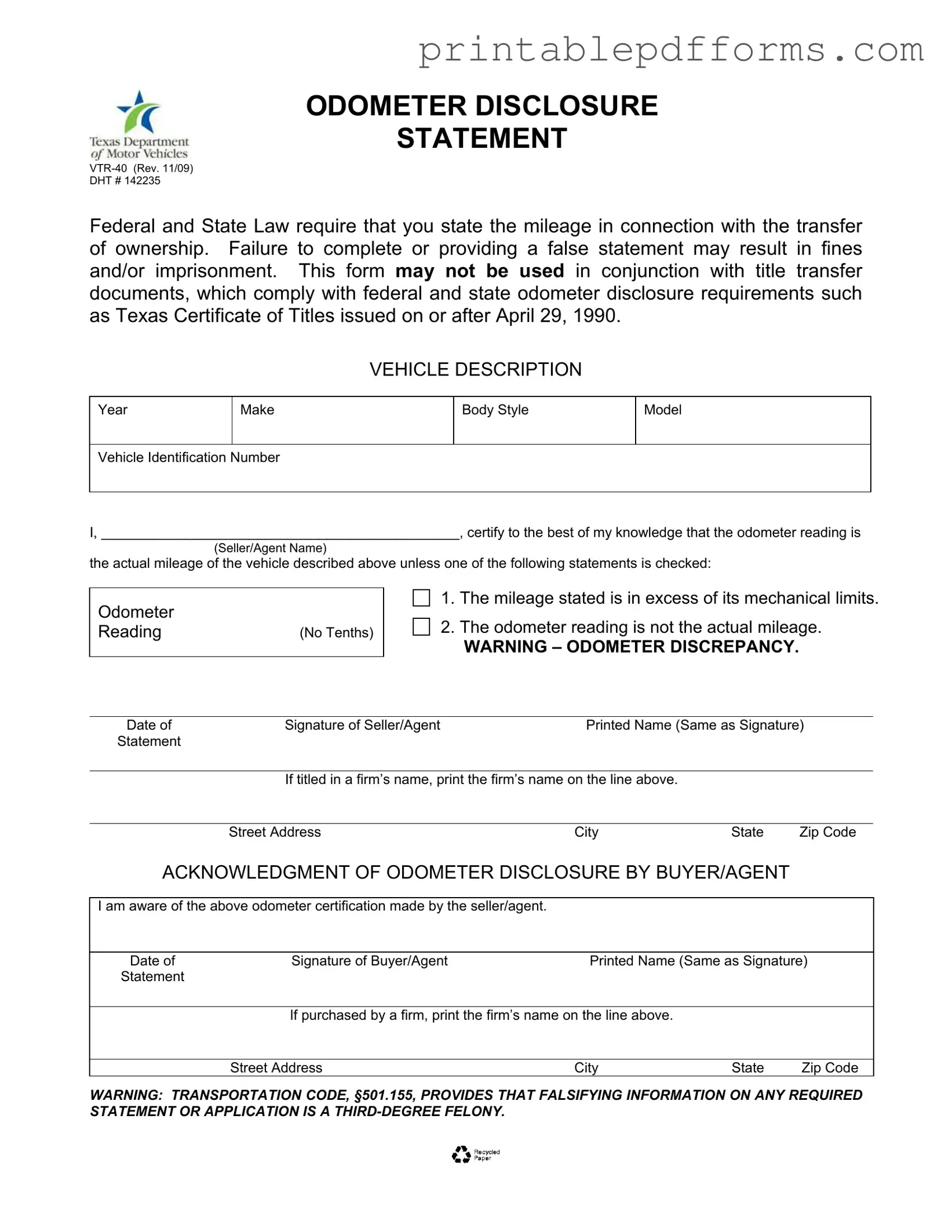Fill a Valid Texas Odometer Statement Form
When buying or selling a vehicle in Texas, understanding the Texas Odometer Statement form is crucial for both parties involved in the transaction. This form, officially known as VTR-40, serves as a vital document that ensures transparency regarding the vehicle's mileage at the time of ownership transfer. According to federal and state laws, it's mandatory to disclose the odometer reading to prevent fraud and protect consumers. The form requires specific details, including the vehicle's year, make, model, and identification number, along with a certification from the seller regarding the accuracy of the mileage. Buyers and agents must also acknowledge the odometer disclosure, confirming their awareness of the seller's statements. Notably, the form cannot be used alongside title transfer documents that comply with existing odometer disclosure regulations, particularly for titles issued after April 29, 1990. It’s important to note that providing false information on this form can lead to serious consequences, including fines and potential imprisonment. Thus, understanding and accurately completing the Texas Odometer Statement is essential for a smooth and legal vehicle transaction.
Additional PDF Templates
262 Form - Each section of the form addresses a specific aspect of the transfer, simplifying the process for both parties.
For comprehensive guidance on completing the necessary paperwork, including the crucial WC-1 Georgia form, employers can visit georgiapdf.com/wc-1-georgia/ to ensure they fulfill their reporting obligations accurately and avoid potential penalties.
Da 638 - Each nomination should align with the core values of the military service.
Similar forms
The Texas Odometer Statement form serves a specific purpose in vehicle ownership transfers. Several other documents share similarities in their function or requirements. Here are five such documents:
- Vehicle Title: The vehicle title is a legal document that proves ownership. Like the Odometer Statement, it includes important information about the vehicle and requires accurate details to avoid legal issues.
- Bill of Sale: This document records the sale of a vehicle. It outlines the transaction details, including the sale price and vehicle information, similar to the odometer disclosure's focus on accurate vehicle details.
- Trailer Bill of Sale: This document is essential for the transfer of trailer ownership, ensuring that both parties have a clear understanding of the transaction. For those needing this document, you can open the pdf to get a template tailored for Florida.
- Application for Texas Title: This form is used to apply for a new title in Texas. It also requires specific vehicle information and the disclosure of any odometer discrepancies, reflecting the same emphasis on accurate mileage information.
- Vehicle Registration Application: When registering a vehicle, this application requires the submission of mileage information. Both documents aim to ensure transparency regarding the vehicle’s condition and history.
- Odometer Disclosure Statement (Federal Form): This federal form is similar to the Texas Odometer Statement. It serves the same purpose of disclosing mileage when transferring ownership, ensuring compliance with federal regulations.
Document Example

ODOMETER DISCLOSURE
STATEMENT
DHT # 142235
Federal and State Law require that you state the mileage in connection with the transfer of ownership. Failure to complete or providing a false statement may result in fines and/or imprisonment. This form may not be used in conjunction with title transfer documents, which comply with federal and state odometer disclosure requirements such as Texas Certificate of Titles issued on or after April 29, 1990.
VEHICLE DESCRIPTION
Year
Make
Body Style
Model
Vehicle Identification Number
I, ______________________________________________, certify to the best of my knowledge that the odometer reading is
the actual mileage of the vehicle described above unless one of the following statements is checked:
Odometer
Reading |
(No Tenths) |
1.The mileage stated is in excess of its mechanical limits.
2.The odometer reading is not the actual mileage.
WARNING – ODOMETER DISCREPANCY.
Date ofSignature of Seller/AgentPrinted Name (Same as Signature) Statement
If titled in a firm’s name, print the firm’s name on the line above.
Street Address |
City |
State |
Zip Code |
ACKNOWLEDGMENT OF ODOMETER DISCLOSURE BY BUYER/AGENT
I am aware of the above odometer certification made by the seller/agent.
Date of |
Signature of Buyer/Agent |
Printed Name (Same as Signature) |
Statement |
|
|
If purchased by a firm, print the firm’s name on the line above.
Street Address |
City |
State |
Zip Code |
WARNING: TRANSPORTATION CODE, §501.155, PROVIDES THAT FALSIFYING INFORMATION ON ANY REQUIRED STATEMENT OR APPLICATION IS A
Form Specs
| Fact Name | Description |
|---|---|
| Form Purpose | The Texas Odometer Statement form (VTR-40) is used to disclose the mileage of a vehicle during the transfer of ownership. |
| Legal Requirement | Federal and State laws mandate that the mileage must be stated accurately to avoid penalties, including fines or imprisonment. |
| Usage Limitations | This form cannot be used with title transfer documents that comply with federal and state odometer disclosure requirements, such as Texas Certificates of Title issued after April 29, 1990. |
| Certification Statement | The seller or agent must certify that the odometer reading reflects the actual mileage, unless specific conditions are indicated. |
| Legal Consequences | According to Transportation Code, §501.155, falsifying information on this form is classified as a third-degree felony. |
Crucial Questions on This Form
What is the Texas Odometer Statement form?
The Texas Odometer Statement form, also known as VTR-40, is a document required by federal and state law to disclose the mileage of a vehicle during the transfer of ownership. It ensures that buyers receive accurate information about the vehicle's mileage, protecting them from potential fraud.
Who needs to complete the Odometer Statement?
Both the seller and the buyer (or their agents) must complete the Odometer Statement. The seller certifies the accuracy of the odometer reading, while the buyer acknowledges the disclosure. This process is essential for all vehicle transactions in Texas.
What information is required on the form?
The Odometer Statement requires several key pieces of information, including:
- Year of the vehicle
- Make of the vehicle
- Body style
- Model
- Vehicle Identification Number (VIN)
- The odometer reading (without tenths)
What happens if I provide false information?
Providing false information on the Odometer Statement can lead to severe consequences. Under Texas law, this act is considered a third-degree felony, which may result in fines and imprisonment. It is crucial to be truthful when completing the form.
Can the Odometer Statement be used with title transfer documents?
No, the Texas Odometer Statement form cannot be used in conjunction with title transfer documents that already comply with federal and state odometer disclosure requirements. For vehicles with titles issued on or after April 29, 1990, the title itself will contain the necessary odometer information.
What are the exceptions to the odometer reading?
The form allows for two exceptions regarding the odometer reading:
- The mileage stated is in excess of the vehicle's mechanical limits.
- The odometer reading is not the actual mileage.
If either of these statements applies, the seller must check the appropriate box on the form.
Is there a specific format for the odometer reading?
Yes, the odometer reading must be stated without tenths. This means that only whole numbers should be reported, such as 50,000 miles instead of 50,000.5 miles.
What is the role of the buyer in this process?
The buyer's role is to acknowledge the odometer certification made by the seller. By signing the form, the buyer confirms they are aware of the odometer reading and accepts the information provided.
Where can I obtain the Texas Odometer Statement form?
The Texas Odometer Statement form can be obtained from the Texas Department of Motor Vehicles (TxDMV) website or at local county tax offices. It is advisable to use the most current version of the form to ensure compliance with state regulations.
What should I do if I have further questions?
If you have additional questions about the Texas Odometer Statement or the vehicle transfer process, consider reaching out to the Texas Department of Motor Vehicles or consulting with a legal expert who specializes in vehicle transactions.
Documents used along the form
When transferring ownership of a vehicle in Texas, several forms and documents accompany the Texas Odometer Statement to ensure a smooth and compliant transaction. Each document plays a crucial role in the overall process, safeguarding both the buyer and seller's interests. Below are some commonly used forms that are often necessary alongside the Odometer Statement.
- Texas Certificate of Title: This document serves as the official proof of ownership for a vehicle. It includes essential information such as the vehicle's make, model, and identification number, as well as details about the current owner and any previous owners. The certificate must be signed over to the new owner during the sale.
- Application for Texas Title: This form is used when a buyer needs to apply for a new title after purchasing a vehicle. It requires information about the buyer, the vehicle, and any liens that may exist. Completing this application is essential for legally registering the vehicle in the new owner’s name.
- Bill of Sale: A Bill of Sale is a written agreement between the buyer and seller that documents the sale of the vehicle. It outlines the sale price, vehicle details, and the terms of the transaction. This document serves as proof of the sale and is important for both parties to retain for their records.
- Ohio Notary Acknowledgement form: A crucial document for verifying the authenticity of a signer's signature in Ohio, vital for preventing fraud and ensuring reliable transactions. For more information, visit All Ohio Forms.
- Vehicle Registration Application: This application is necessary for registering the vehicle with the state. It includes information about the vehicle and the new owner, and it is typically submitted along with the title application. Registration is crucial for obtaining license plates and legally operating the vehicle.
- Affidavit of Heirship: In cases where a vehicle is inherited, this affidavit may be needed to establish the rightful ownership of the vehicle. It confirms the relationship between the deceased and the inheritor, ensuring that the transfer of ownership is legally recognized.
Understanding these documents and their purposes can help facilitate a seamless vehicle transfer process in Texas. It is essential to ensure that all necessary forms are completed accurately to avoid any potential issues in the future.
Misconceptions
Misconceptions about the Texas Odometer Statement form can lead to confusion for both sellers and buyers. Below is a list of common misconceptions along with explanations.
- The form is only required for older vehicles. The Texas Odometer Statement is required for all vehicle transfers, regardless of the vehicle's age.
- Only the seller needs to sign the form. Both the seller and the buyer or their agents must sign the form to acknowledge the odometer disclosure.
- The form can be used with any title transfer document. This form cannot be used in conjunction with title transfer documents that already meet federal and state odometer disclosure requirements.
- Providing a false odometer reading is a minor issue. Falsifying information on the form is considered a third-degree felony under Texas law, which carries serious penalties.
- Odometer discrepancies do not need to be reported. Any discrepancies must be reported on the form to avoid legal issues for both parties.
- The mileage must be exact. The form allows for the odometer reading to be stated without tenths, which means rounding to the nearest mile is acceptable.
- Only private sellers need to complete this form. Dealers and agents also have the responsibility to complete and sign the Texas Odometer Statement when transferring ownership.
- The form is optional if the vehicle is sold for parts. Even if a vehicle is sold for parts, the odometer statement is still required to document the mileage at the time of sale.
